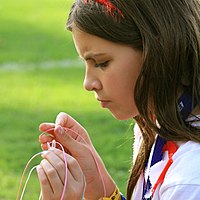
Photo from wikipedia
Three experiments (a, b, c) combined to provide a well-powered examination of the effects of stimulus pre-exposure and conditioning on visual attention using an eye tracker and a space-shooter video… Click to show full abstract
Three experiments (a, b, c) combined to provide a well-powered examination of the effects of stimulus pre-exposure and conditioning on visual attention using an eye tracker and a space-shooter video game where a colored flashing light predicted an attacking spaceship. In each, group "control" received no pre-exposure to the light, group "same" received pre-exposure in the same context as conditioning, and group "different" received pre-exposure in a different context. Experiments differed in visual details regarding the game (1a vs. 1b and 1c) or minor details in the setup of the eye tracker (1a and 1b vs. 1c). Overall, pre-exposure retarded acquisition of keyboard responding. That effect was enhanced, rather than attenuated, by a context change. Separating participants by sign and goal trackers showed the context change enhanced the pre-exposure effect in goal trackers and reduced it in sign trackers. Visual attention to the light declined during pre-exposure and did not recover with either conditioning or a context switch. Visual attention to the light decreased during conditioning. Visual goal tracking toward where the spaceship would appear was also retarded with pre-exposure. Unlike the keyboard responding, a context change led to more normal goal-tracking acquisition. Results are discussed in terms of theories of attention and the potential effects of demand characteristics on the task. (PsycInfo Database Record (c) 2022 APA, all rights reserved).
Journal Title: Journal of experimental psychology. Animal learning and cognition
Year Published: 2022
Link to full text (if available)
Share on Social Media: Sign Up to like & get
recommendations!